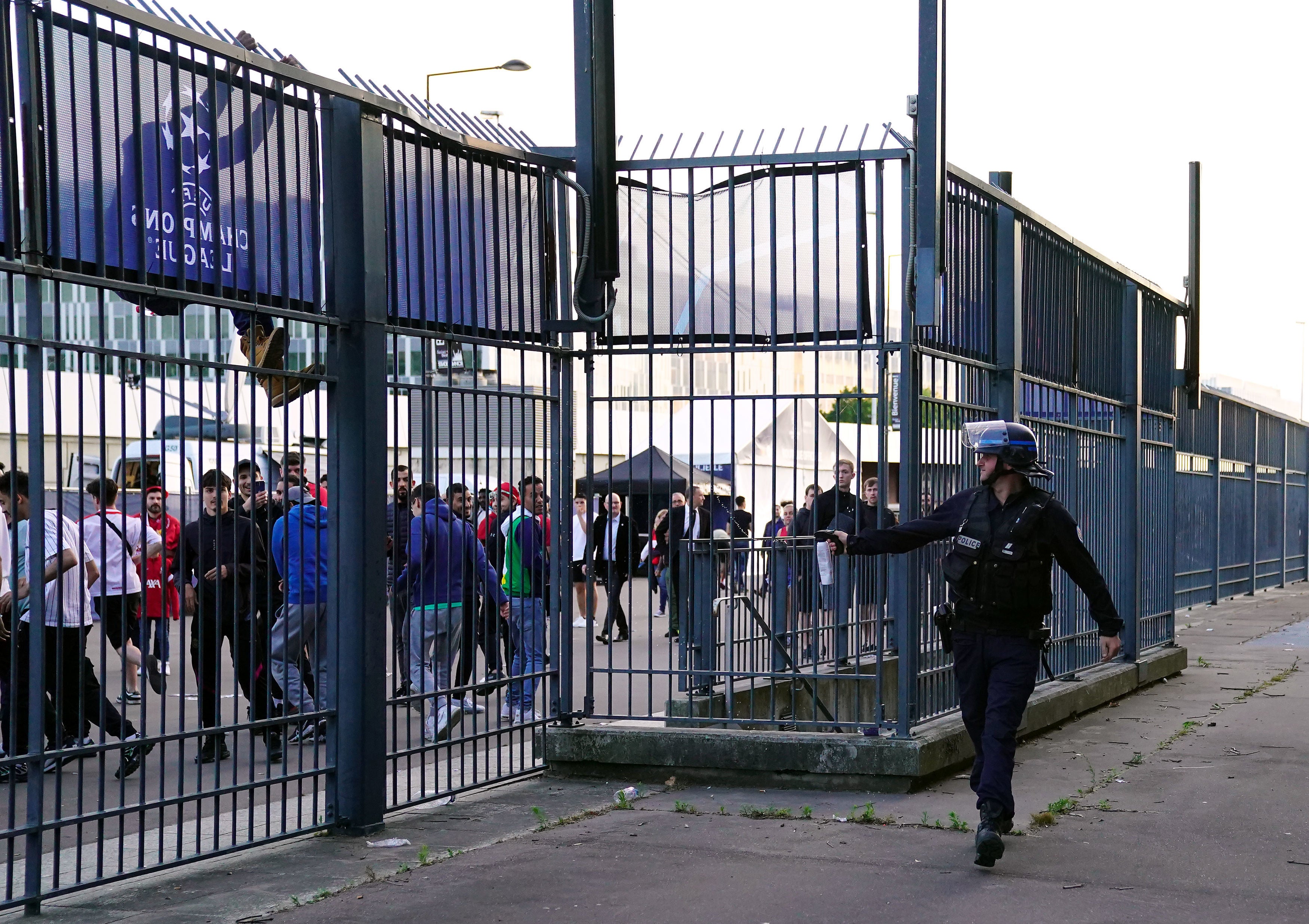Treatment of Liverpool fans in Paris shows lessons have not been learnt
Editorial: The absence of injuries does not excuse another woeful failure by Europe’s football governing body, or the overreaction of the French police

What they hoped would be a night of celebration turned into a double disaster for many Liverpool fans attending the Champions League final in Paris. On the pitch, the heroics of Real Madrid’s goalkeeper denied the English team a third trophy. After a remarkable season, winning the two domestic cup competitions will feel like a disappointment.
Unfortunately, Saturday’s match at the Stade de Paris will be remembered by many for another reason. Shambolic security arrangements meant that thousands of Liverpool supporters faced long delays as they tried to get into the ground.
Many became victims of overzealous policing, which saw the use of teargas, pepper spray and riot shields against innocent fans waiting patiently to gain entry. Although French police are well practised at responding to violence in a country with a long history of protest, it was patently obvious that they were dealing with a group of people who were not determined to cause trouble, but merely fans who wanted to watch a football match.
The dangerous crush that developed after people were funnelled into inadequate, narrow entry points will have brought back horrific memories of the 1989 Hillsborough disaster, which killed 97 Liverpool fans, and the 1985 Heysel Stadium tragedy, in which 39 people perished.
Mercifully, there appear to have been no serious injuries in Paris – although many of those present, including women, children and disabled people, were traumatised by events that were totally beyond their control. Though kick-off was delayed by 36 minutes, many Liverpool fans were not able to get into the ground by then, while others gave up because they feared for their safety.
The absence of injuries does not excuse another woeful failure by UEFA, Europe’s football governing body, or the overreaction of the French police. Initially, UEFA pointed the finger of blame at Liverpool fans for turning up late. This was roundly contradicted by the eyewitness accounts of supporters who had queued for up to three hours.
Later, UEFA said: “The turnstiles at the Liverpool end of the stadium became blocked by thousands of fans who had purchased fake tickets, which did not work in the turnstiles.” This a long-standing problem, and was bound to happen at European football’s biggest showpiece. It could and should have been limited by the use of electronic rather than paper tickets: e-tickets on mobile phones are now commonplace at domestic games.
The problems outside the stadium seem to have been made worse by the presence of French gangs, while the vast majority of Liverpool supporters were innocent victims. A representative of Merseyside Police, who was deployed in Paris, described it as “the worst European match I’ve ever worked or experienced”, adding: “I thought the behaviour of the fans at the turnstiles was exemplary in shocking circumstances. You were not late 100 per cent.”
Liverpool FC have rightly asked for a formal investigation; UEFA and the French authorities should carry one out as soon as possible. They should have been alert to the problem of ticketless fans after the problems caused by shambolic security at the Euro 2020 final at Wembley last July, when 2,000 people forced their way into the stadium.
The actions of the French police will not have come as a surprise to any English supporter who has attended a game abroad. Sadly, the reputation of English fans goes before them. They are often treated like “animals”, a word used by some Liverpool supporters at the weekend, because in the past they have sometimes behaved like them, both at home and abroad.
To keep up to speed with all the latest opinions and comment, sign up to our free weekly Voices Dispatches newsletter by clicking here
It is true that hooliganism has not been totally eradicated. As the former civil servant Louise Casey noted in her review of the Euro 2020 final: “For too long, the actions of a minority of England fans have been tolerated as a part of our national culture (albeit an embarrassing one), rather than confronted head-on.”
Worryingly, there were several pitch invasions at the ends of matches as the domestic season drew to a close, and players were attacked. This was seen by some experts as a reaction to the Covid lockdowns, although that provides no excuse.
However, when fans travel abroad, they should not be stigmatised by a largely outdated caricature. It is worth noting that there have been no incidents this season as Liverpool fans travelled around Europe on their team’s route to the final.
The football and police authorities seem remarkably unwilling, or unable, to learn lessons from the stadium disasters that have scarred the beautiful game since the 1980s. The lesson from Paris is that they should no longer be allowed to blame their own abject failure on a tiny minority of supporters.






Join our commenting forum
Join thought-provoking conversations, follow other Independent readers and see their replies
Comments